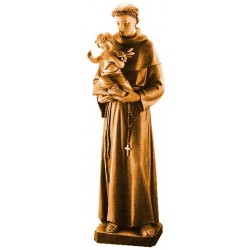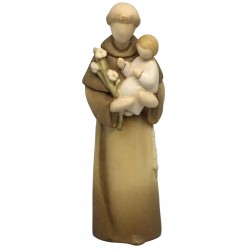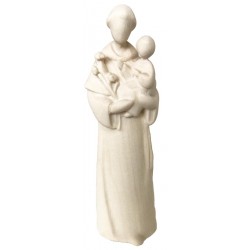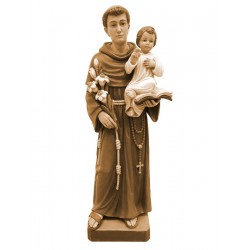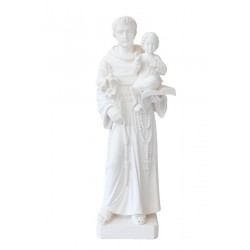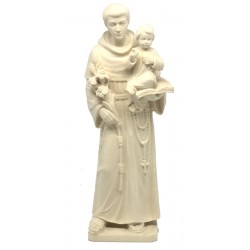Cart 0 Product Products (empty)
No products
To be determined Shipping
0,00 € Total
Product successfully added to your shopping cart
Quantity
Total
There are 0 items in your cart. There is 1 item in your cart.
Total products
Total shipping To be determined
Total
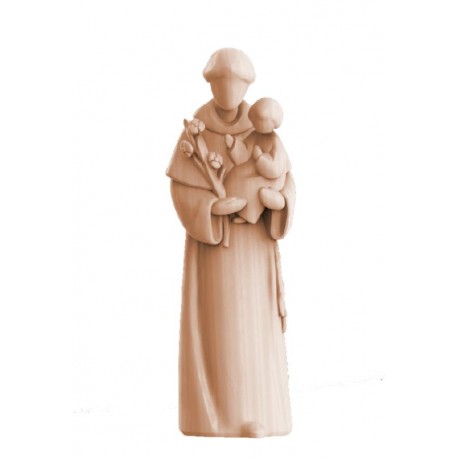 View larger
View larger Saint Anthony Statue wood carved - Middle brown stained
New product
More info
Saint Anthony Statue wood carved from Sculptors Miniature Catholic Statues; Saint Anthony was born Fernando Martins in Lisbon, Portugal. He was born into a wealthy family and at the age of fifteen he asked to be sent to the Abbey of Santa Cruz in Coimbra, the then capital of Portugal. During his stay in the Abbey, he learned theology and Latin.
After his priestly ordination, he was appointed guest director and was responsible for the hospitality of the abbey. When the Franciscan friars established a small hermitage outside Coimbra dedicated to Saint Anthony of Egypt, Fernando felt the desire to join them.
Fernando eventually received permission to leave the Abbey so that he could join the new Franciscan order. When he was admitted, he changed his name to Anthony.
Anthony then went to Morocco to spread God's truth, but he became seriously ill and was brought back to Portugal for recovery. the return journey was interrupted and the group arrived in Sicily, from where they left for Tuscany. Atonia was assigned to the hermitage of San Paolo after the local friars considered her health.
When he recovered, Anthony spent his time praying and studying.
An indefinite time later, the Dominican friars came to visit the Franciscans and there was confusion as to who would give the homily. the Dominicans were known for their preaching, so the Franciscans assumed they were the one to provide a homilist, but the Dominicans assumed that the Franciscans would provide one. It was then the head of the Franciscan hermitage who asked Antonio to speak about whatever the Holy Spirit had told him to speak.
Though he tried to object, Anthony delivered an eloquent and moving homily that impressed both groups. Soon, the news of his eloquence reached Francis of Assisi, who harbored a strong distrust of the brotherhood's commitment to a life of poverty. However, in Anthony, he found a friend.
In 1224, Francis entrusted the studies of his friars to Antonio. Anthony had a book of psalms that contained notes and commentaries to help when teaching students and, in an age when a printing press had not yet been invented, he greatly appreciated it.
When a novice decided to leave the hermitage, he stole Anthony's precious book. When Anthony found it missing, he prayed that it would be found or returned to him. the thief returned the book and in a further passage he also returned to the Order.
the book would now be kept in the Franciscan convent of Bologna.
from time to time Anthony taught at the universities of Montpellier and Toulouse in southern France, but he performed best in the role of preacher.
So simple and sensational was his teaching of the Catholic faith, the most illiterate and innocent could understand his messages. for this reason he was declared a Doctor of the Church by Pope Pius XII in 1946.
once, when Saint Anthony of Padua attempted to preach the true Gospel of the Catholic Church to heretics who did not want to hear him, he went out and preached his message to the fish. This was not, as liberals and naturalists have tried to say, for the education of the fish, but rather for the glory of God, the joy of the angels and the relief of his heart. When critics saw the fish start harvesting, they realized they Dolfi wood carving also listen to what Anthony had to say.
He was only 35 when he died and was canonized less than a year later by Pope Gregory IX. After the exhumation, some 336 years after his death, his body was found corrupted, but his tongue was totally uncorrupted, so perfect were the teachings that were formed about it.
He is typically depicted with a book and the Baby Jesus and is commonly referred to today as the ""finder for lost items"".
St. Anthony is revered around the world as the patron saint of lost property, and is credited with many miracles involving lost people, lost property, and even lost spiritual possessions.
After his priestly ordination, he was appointed guest director and was responsible for the hospitality of the abbey. When the Franciscan friars established a small hermitage outside Coimbra dedicated to Saint Anthony of Egypt, Fernando felt the desire to join them.
Fernando eventually received permission to leave the Abbey so that he could join the new Franciscan order. When he was admitted, he changed his name to Anthony.
Anthony then went to Morocco to spread God's truth, but he became seriously ill and was brought back to Portugal for recovery. the return journey was interrupted and the group arrived in Sicily, from where they left for Tuscany. Atonia was assigned to the hermitage of San Paolo after the local friars considered her health.
When he recovered, Anthony spent his time praying and studying.
An indefinite time later, the Dominican friars came to visit the Franciscans and there was confusion as to who would give the homily. the Dominicans were known for their preaching, so the Franciscans assumed they were the one to provide a homilist, but the Dominicans assumed that the Franciscans would provide one. It was then the head of the Franciscan hermitage who asked Antonio to speak about whatever the Holy Spirit had told him to speak.
Though he tried to object, Anthony delivered an eloquent and moving homily that impressed both groups. Soon, the news of his eloquence reached Francis of Assisi, who harbored a strong distrust of the brotherhood's commitment to a life of poverty. However, in Anthony, he found a friend.
In 1224, Francis entrusted the studies of his friars to Antonio. Anthony had a book of psalms that contained notes and commentaries to help when teaching students and, in an age when a printing press had not yet been invented, he greatly appreciated it.
When a novice decided to leave the hermitage, he stole Anthony's precious book. When Anthony found it missing, he prayed that it would be found or returned to him. the thief returned the book and in a further passage he also returned to the Order.
the book would now be kept in the Franciscan convent of Bologna.
from time to time Anthony taught at the universities of Montpellier and Toulouse in southern France, but he performed best in the role of preacher.
So simple and sensational was his teaching of the Catholic faith, the most illiterate and innocent could understand his messages. for this reason he was declared a Doctor of the Church by Pope Pius XII in 1946.
once, when Saint Anthony of Padua attempted to preach the true Gospel of the Catholic Church to heretics who did not want to hear him, he went out and preached his message to the fish. This was not, as liberals and naturalists have tried to say, for the education of the fish, but rather for the glory of God, the joy of the angels and the relief of his heart. When critics saw the fish start harvesting, they realized they Dolfi wood carving also listen to what Anthony had to say.
He was only 35 when he died and was canonized less than a year later by Pope Gregory IX. After the exhumation, some 336 years after his death, his body was found corrupted, but his tongue was totally uncorrupted, so perfect were the teachings that were formed about it.
He is typically depicted with a book and the Baby Jesus and is commonly referred to today as the ""finder for lost items"".
St. Anthony is revered around the world as the patron saint of lost property, and is credited with many miracles involving lost people, lost property, and even lost spiritual possessions.



